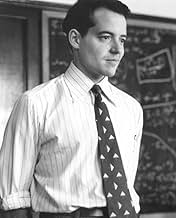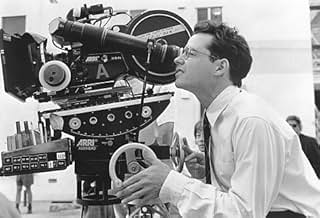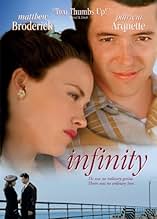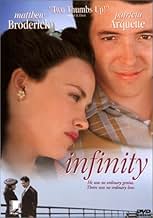CALIFICACIÓN DE IMDb
6.2/10
2.1 k
TU CALIFICACIÓN
Historia de los primeros años de vida del genio y físico ganador del Premio Nobel Richard Feynman.Historia de los primeros años de vida del genio y físico ganador del Premio Nobel Richard Feynman.Historia de los primeros años de vida del genio y físico ganador del Premio Nobel Richard Feynman.
- Dirección
- Guionistas
- Elenco
Raffi Di Blasio
- Robert
- (as Raffi DiBlasio)
Josh Keaton
- David
- (as Joshua Wiener)
- Dirección
- Guionistas
- Todo el elenco y el equipo
- Producción, taquilla y más en IMDbPro
Opiniones destacadas
There is very little more that I can add to the kudos for this film, other than utter praise. I can understand and I know. You see, I am one of these people, a Scientist.
We as a breed are seldom understood and, more often than not, badly served by cinema image. This film of the quiet, patient, dedicated love between two people, one of whom is a Scientist, is a milestone.
Might I add that I have always felt that Matthew Broderick is a fantastic actor, especially in roles that require an average looking, quiet introspective character. He is perfect for this cinematic vehicle, and equal to the talents of a Tom Hanks any day. I was also impressed that he produced, directed and shared writing credits on this film project.
We as a breed are seldom understood and, more often than not, badly served by cinema image. This film of the quiet, patient, dedicated love between two people, one of whom is a Scientist, is a milestone.
Might I add that I have always felt that Matthew Broderick is a fantastic actor, especially in roles that require an average looking, quiet introspective character. He is perfect for this cinematic vehicle, and equal to the talents of a Tom Hanks any day. I was also impressed that he produced, directed and shared writing credits on this film project.
This was a very worthy project of the Brodericks, mother and son, and one which I would have liked to have tackled myself, having read and greatly enjoyed both "Surely You're Joking, Mr. Feynman!" and "What Do You Care What Other People Think?". To concentrate on the deep love story between Feynman and his first wife Arline, which coincided with his work on the Manhattan Project at Los Alamos, was, I feel, a good filmic move in order to give the story an anchor (not to mention the fact that it truly is one of the most romantic real love stories I've ever heard of). Every movie adaptation has to make sacrifices, and this one obviously had to sacrifice all the other interesting stuff that happened to Feynman in the years after the war. So I don't have a problem with the quality of the script, and they also had a big enough budget to get the period feel.
However, this film falls down in a major way on the characterisation of its lead character. Surprisingly, for Broderick is not a bad actor, he just comes across as being Broderick - a good looking young man who can look lovingly at Patricia Arquette and add a bit of passion to his voice when explaining complicated physics. But we've all seen the real Feynman on television and in film - he was LARGER than life! He was intensely charismatic, a brilliant expositor of scientific ideas and a great teacher.
It seems to me that instead of succumbing to the temptation of directing, that Broderick should really have got someone else direct, so that he could concentrate on really getting inside the head of Feynman and reproducing on screen some of that charisma - something I'm quite sure Broderick is capable of doing.
So ultimately this is a missed opportunity. You learn some of the facts about what happened, but you don't really meet the real Richard P. Feynman.
However, this film falls down in a major way on the characterisation of its lead character. Surprisingly, for Broderick is not a bad actor, he just comes across as being Broderick - a good looking young man who can look lovingly at Patricia Arquette and add a bit of passion to his voice when explaining complicated physics. But we've all seen the real Feynman on television and in film - he was LARGER than life! He was intensely charismatic, a brilliant expositor of scientific ideas and a great teacher.
It seems to me that instead of succumbing to the temptation of directing, that Broderick should really have got someone else direct, so that he could concentrate on really getting inside the head of Feynman and reproducing on screen some of that charisma - something I'm quite sure Broderick is capable of doing.
So ultimately this is a missed opportunity. You learn some of the facts about what happened, but you don't really meet the real Richard P. Feynman.
Most of this movie concentrates on the life of Nobel Prize physicist Richard Feynman (born in 1918), roughly from age twenty to twenty-seven. During this time he got his Ph.D. from Princeton and participated in the Manhattan Project. Also in that time frame he met and married Arline Greenbaum. There are a couple of scenes, with Feynman being around the age of six, that establish his inquiring mind and his relationship with his father, but the main thrust of the movie details the relationship between Richard and Arline.
Having read Feynman's books "Surely You're Joking Mr. Feynman" and "What Do You Care What Other people Think," as well as having viewed several of his videos on YouTube, I felt that this movie did not capture what I perceive as Feynman's impishness and openness. Maybe this was because during the time period covered Feynman was dealing not only with his early career challenges but also with the serious health problems of Arline. I thought the movie did a good job of detailing how Feynman coped with the difficult conflict between his professional ambitions and his love and devotion to Arline.
I suppose most people's image of the 1940s comes from looking at bleached out color photos and videos from that time. Whoever decided on the lighting for this movie must have been under the impression that that is what things looked like at the time, since there seems to be some sepia-toned cast to much of the film. I suppose the desire was to add some sense of nostalgia for a past era, but I found the rather dark filming fosters an overall fogginess.
Feynman's academic career was glossed over with there being little desire to inform the audience as to what his scientific interests were. There was no mention of what his contributions were to the Manhattan Project, or why he was chosen to go to Los Alamos. There was some odd editing like the insertion early on of a hand tossing out small pieces of paper from atop a wooden post. After the atomic blast at Alamogordo there is a scene of Fermi doing some measurements of how the pieces of paper were scattered in order to estimate the power of the blast, but this was not made clear enough for most people to make the appropriate deduction. Also, the movie has Feynman looking at the atomic blast with unaided eyes which would have caused retinal burns.
The score tries to be manipulative, but winds up being intrusive. Every time there is a tender moment some sappy music is played.
I wish this movie could have given more of a hint of Feynman's being a witty, free-spirited genius, which I think he was.
Having read Feynman's books "Surely You're Joking Mr. Feynman" and "What Do You Care What Other people Think," as well as having viewed several of his videos on YouTube, I felt that this movie did not capture what I perceive as Feynman's impishness and openness. Maybe this was because during the time period covered Feynman was dealing not only with his early career challenges but also with the serious health problems of Arline. I thought the movie did a good job of detailing how Feynman coped with the difficult conflict between his professional ambitions and his love and devotion to Arline.
I suppose most people's image of the 1940s comes from looking at bleached out color photos and videos from that time. Whoever decided on the lighting for this movie must have been under the impression that that is what things looked like at the time, since there seems to be some sepia-toned cast to much of the film. I suppose the desire was to add some sense of nostalgia for a past era, but I found the rather dark filming fosters an overall fogginess.
Feynman's academic career was glossed over with there being little desire to inform the audience as to what his scientific interests were. There was no mention of what his contributions were to the Manhattan Project, or why he was chosen to go to Los Alamos. There was some odd editing like the insertion early on of a hand tossing out small pieces of paper from atop a wooden post. After the atomic blast at Alamogordo there is a scene of Fermi doing some measurements of how the pieces of paper were scattered in order to estimate the power of the blast, but this was not made clear enough for most people to make the appropriate deduction. Also, the movie has Feynman looking at the atomic blast with unaided eyes which would have caused retinal burns.
The score tries to be manipulative, but winds up being intrusive. Every time there is a tender moment some sappy music is played.
I wish this movie could have given more of a hint of Feynman's being a witty, free-spirited genius, which I think he was.
What a nice movie! If you do not know who Richard Feynman was, then this is a great way to be introduced. He was a brilliant, eccentric, witty scientist who came of age during the 1930s and 1940s. This movie doesn't show his entire life, just the parts that lead up to his involvement with the atomic bomb and the Manhattan Project during WWII. It's based on his books called 'What Do You Care What Other People Think?' and 'Surely You're Joking. Mr. Feynman!' The Movie doesn't deal with his actual scientific work so much as his unconventional approach to it. It also deals with his first marriage to Arline, who was very ill with systemic tuberculosis. The movie takes you from his childhood and university years to his marriage and time at the famous Los Alamos Lab. I think I liked this movie because it doesn't come out and tell you what to think, it just shows snippets of his life and how he overcomes the sad times with humor and grace. I can't say enough about this film. It's that good.
This was kind of a strange, low-key movie, one that isn't going to get a lot of attention, especially with a younger audience which wants anything but a slow- moving story. But, whatever your age, if you want simply a nice movie, you have one here.
Other reviewers here have gone into the details about the real-life persons this film is based on, so I will just make a few general comments I had while watching this.
First, I enjoyed Matthew Broderick's narration. Broderick usually plays likable roles and is an underrated actor, I think. I've never seen him in a bad performance. Even though this story is an emotional one, I found little emotion in the film but that makes it intriguing in parts.
Sometime past the halfway mark, I asked myself, "What is the point of this story?" There is a point, and there is more than what meets the eye to this. Those who have seen this film know what I mean. I'm making vague statements, but I don't want to give away anything.
I enjoyed the 1940s look to this, appreciated Patricia Arquette's against-type role; appreciated the fact there were no villains in here and the profanity was low. As I said, it's a nice film and touching drama.
Broderick and his mother wrote, produced and directed this film.
Other reviewers here have gone into the details about the real-life persons this film is based on, so I will just make a few general comments I had while watching this.
First, I enjoyed Matthew Broderick's narration. Broderick usually plays likable roles and is an underrated actor, I think. I've never seen him in a bad performance. Even though this story is an emotional one, I found little emotion in the film but that makes it intriguing in parts.
Sometime past the halfway mark, I asked myself, "What is the point of this story?" There is a point, and there is more than what meets the eye to this. Those who have seen this film know what I mean. I'm making vague statements, but I don't want to give away anything.
I enjoyed the 1940s look to this, appreciated Patricia Arquette's against-type role; appreciated the fact there were no villains in here and the profanity was low. As I said, it's a nice film and touching drama.
Broderick and his mother wrote, produced and directed this film.
¿Sabías que…?
- TriviaThe gate scene at Los Alamos is accurate and Richard had many more pranks that he pulled while working there. Most notably he picked locks. The one unique combination of locks was a series of file cabinets in a mathematicians office where the combinations began with the first few digits of the natural logarithm of e.
- Créditos curiososThe film has a 1997 copyright date in the credits, despite being released in 1996.
- Bandas sonorasUgly Chile (You're Some Pretty Doll)
Written by Clarence Williams
Published by Shapiro, Bernstein & Co., Inc. (ASCAP)
Copyright renewed
Selecciones populares
Inicia sesión para calificar y agrega a la lista de videos para obtener recomendaciones personalizadas
- How long is Infinity?Con tecnología de Alexa
Detalles
- Fecha de lanzamiento
- País de origen
- Sitio oficial
- Idioma
- También se conoce como
- Oändlig kärlek
- Locaciones de filmación
- Productoras
- Ver más créditos de la compañía en IMDbPro
Taquilla
- Total en EE. UU. y Canadá
- USD 195,170
- Fin de semana de estreno en EE. UU. y Canadá
- USD 78,976
- 6 oct 1996
- Total a nivel mundial
- USD 195,170
- Tiempo de ejecución1 hora 59 minutos
- Color
- Mezcla de sonido
- Relación de aspecto
- 1.66 : 1
Contribuir a esta página
Sugiere una edición o agrega el contenido que falta































